 Petzlover
Petzlover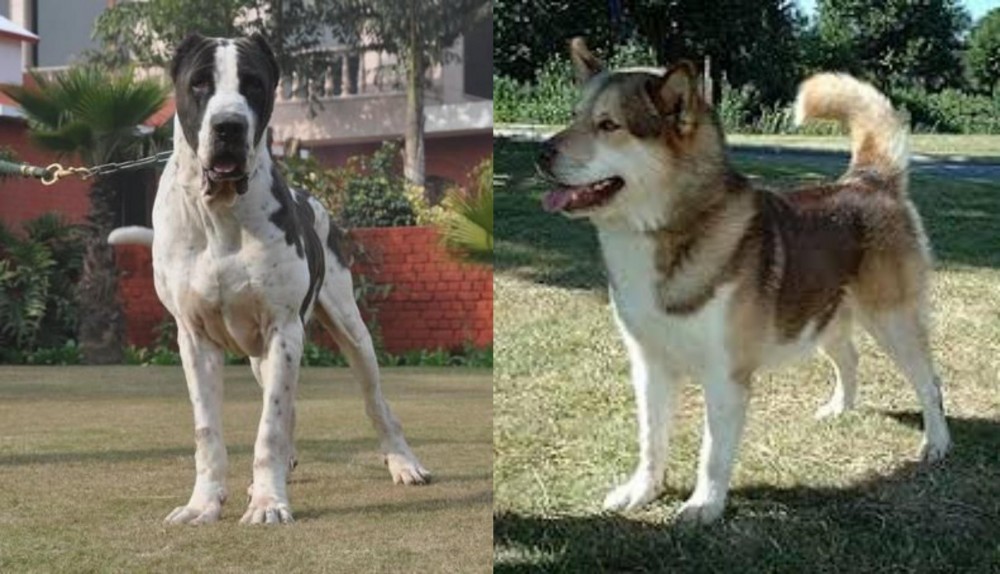 Bully Kutta is originated from India but Greenland Dog is originated from Greenland. Bully Kutta may grow 21 cm / 9 inches higher than Greenland Dog. Bully Kutta may weigh 55 kg / 122 pounds more than Greenland Dog. Both Bully Kutta and Greenland Dog has almost same life span. Bully Kutta may have more litter size than Greenland Dog. Bully Kutta requires Low Maintenance. But Greenland Dog requires Moderate Maintenance
Bully Kutta is originated from India but Greenland Dog is originated from Greenland. Bully Kutta may grow 21 cm / 9 inches higher than Greenland Dog. Bully Kutta may weigh 55 kg / 122 pounds more than Greenland Dog. Both Bully Kutta and Greenland Dog has almost same life span. Bully Kutta may have more litter size than Greenland Dog. Bully Kutta requires Low Maintenance. But Greenland Dog requires Moderate Maintenance
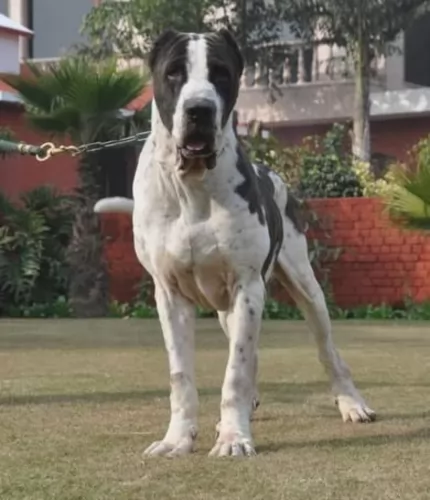 This well built, powerful dog breed is also known as Indian Alangu Mastiff or Pakistani Mastiff. These dogs come from the Punjab and Sindh region of the Indian subcontinent. It is believed that mastiff dogs came with British soldiers during the British invasion, however English Mastiffs, Bulldogs, Bull Terriers and Great Danes are seen as potential ancestors of this large dog.
This well built, powerful dog breed is also known as Indian Alangu Mastiff or Pakistani Mastiff. These dogs come from the Punjab and Sindh region of the Indian subcontinent. It is believed that mastiff dogs came with British soldiers during the British invasion, however English Mastiffs, Bulldogs, Bull Terriers and Great Danes are seen as potential ancestors of this large dog.
There are disputes about the country of origin of this breed, and some people claim that the dog comes from India, while others say it comes from Pakistan. Certainly in Pakistan these dogs are still used for fighting.
 The Greenland dog is an ancient breed of dog hailing from Greenland. The dog was brought to North American from Siberia hundreds of years ago. In fact the very first dogs arrived in the Americas some 12,000 years ago.
The Greenland dog is an ancient breed of dog hailing from Greenland. The dog was brought to North American from Siberia hundreds of years ago. In fact the very first dogs arrived in the Americas some 12,000 years ago.
The Greenland Dog isn’t recognized by the AKC but it is recognized by a number of other groups. While the Greenland Dog is valued in Greenland, it isn't particularly well known in other parts of the world.
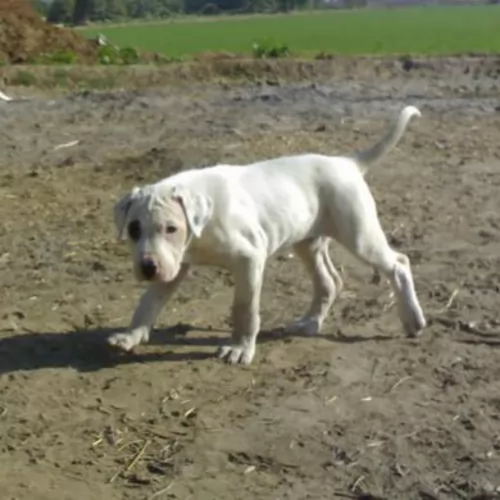 The Bully Kutta is a big, heavy, muscular dog, standing at roughly 81 – 89cm and weighing in at 70–90kg. He isn’t particularly good with children or with other pets simply because the dog is aggressive by nature. If you do opt for this large breed, you’re going to need a large garden and he is going to require a lot of exercise.
The Bully Kutta is a big, heavy, muscular dog, standing at roughly 81 – 89cm and weighing in at 70–90kg. He isn’t particularly good with children or with other pets simply because the dog is aggressive by nature. If you do opt for this large breed, you’re going to need a large garden and he is going to require a lot of exercise.
This is a dog breed that is going to require socialization and training if you want him to be obedient and calm, as he is inclined to be a dominating breed. He’s an intelligent dog and when well trained, he makes a splendid pet with firm, fair owners.
The Bully Kutta has a large, broad head which is supported by a thick well-muscled neck. The skin around his lower jaw is loose. The ears are short, set high and are mostly cropped, but other times they are left to flop over. The tail is sometimes docked but these days mostly left long and tapered.
He has a short smooth coat and is essentially white in color although the coat can also be fawn, brown, black or brindle.
 The Greenland Dog is a heavily built dog, and between the males and females, this medium to large sized dog can be 51 – 68cm in height and weigh 30 – 35kg.
The Greenland Dog is a heavily built dog, and between the males and females, this medium to large sized dog can be 51 – 68cm in height and weigh 30 – 35kg.
He has the typical slanted eyes of the husky-type dogs with a keen, alert expression in them. He has small triangular erect ears. The long, bushy tail of the dog is curled over the back of the dog.
The coat is short to medium length and has 2 layers with the outer layer being fairly coarse. The double coat is thick and shortish but also stand-offish, meaning the hair doesn’t lie flat against the dog’s body. Color of the fur is a mix of cream, beige, white, tan, black, grey or silver.
As a working dog, the Greenland Dog is known for its strength, its boisterous nature and speed. Because its a dog that has worked as a pack, it wants a firm, patient, fair, confident owner to bring out the best in him. Being intelligent, independent and work-orientated, it is perhaps not a great choice for the first-time dog owner who may be out of their realm with the demands of these high-energy dogs.
The dog is independent, but he is quite capable of forming a strong, loving bond with his owner. This is certainly a dog that is never going to thrive if he has to lie around the house all day – he is an active dog who wants a task to do and he is going to need plenty of daily exercise.
They’ve always had active lives pulling sleds or hunting for seals and he craves this busy, active lifestyle. He is the kind of dog that shouldn’t live in the city with a tiny garden unless he has an owner who takes time to walk him and exercise him vigorously. He is a dog that will require training and socialization.
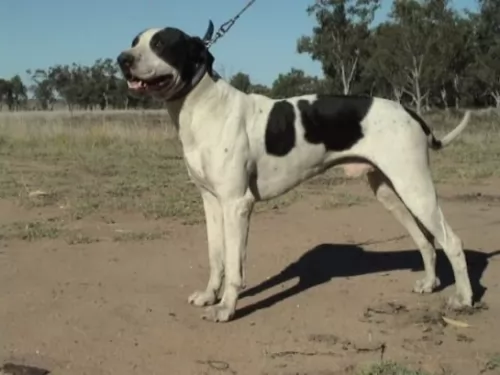 The Bully Kutta is a powerful, imposing dog and they have been nicknamed the ‘Beast from the East’. Unfortunately it is this dog’s thick bones, his looks and his strength that have him used for cruel dog fighting in Pakistan.
The Bully Kutta is a powerful, imposing dog and they have been nicknamed the ‘Beast from the East’. Unfortunately it is this dog’s thick bones, his looks and his strength that have him used for cruel dog fighting in Pakistan.
When not used for fighting, he makes a loyal, devoted companion for the owner who ensures proper socialization and training. Well raised Bully Kuttas are then good with children, being loving, protective and playful.
One just hopes that the future of this giant dog breed is brighter, and that he will be looked upon as more of a companion that just a dog-fighting object to bring in money for his owner.
 Bred as a working dog, the Greenland Dog, native to Greenland is a high energy dog who is boisterous, lively and social. With training and socialization, he becomes an obedient, loyal and devoted pet.
Bred as a working dog, the Greenland Dog, native to Greenland is a high energy dog who is boisterous, lively and social. With training and socialization, he becomes an obedient, loyal and devoted pet.
While he is quite capable of being an awesome domesticated pet, he is essentially a working dog, loving having to be part of a very active lifestyle. He may not be the best pet for a first time owner or a home with small children. This is because he isn't your cuddly, lying-around-the-house, playmate kind of pet. He wants a home and owner similar to himself – strong, active, energetic, bold, independent, strong-willed and firm, and when he gets this, he becomes the splendid pet he is so well known for.
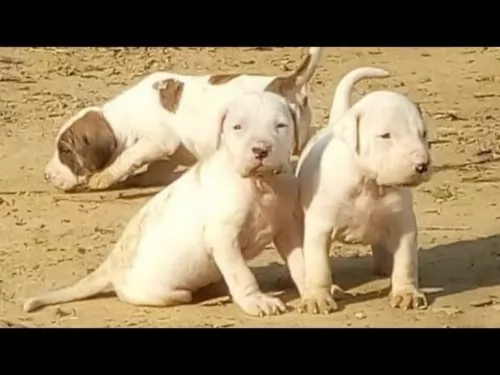 Your Bully Kutta is generally a healthy dog and not often affected by hereditary diseases, but with giant breeds such as this you will have to look out for diseases common to large dogs.
Your Bully Kutta is generally a healthy dog and not often affected by hereditary diseases, but with giant breeds such as this you will have to look out for diseases common to large dogs.
Typical illnesses to watch out for will include hip dysplasia, arthritis, skin allergies and bloat.
This is an inherited condition where the hip joint is improperly formed. For your Bully Kutta it causes wear and tear as well as stiffness in the hips and your dog battles to rise after lying down.
Arthritis in your dog can be managed but it can cause a lot of discomfort for him. This inflammation of the joints can cause pain and stiffness. It is more often seen in older dogs. It can also start at an early age because of problems with bone and joint development and abnormal rubbing within the joint.
Today there are a number of therapy options that can bring some kind of relief to your dog.
 Your Greenland dog can battle with eye problems such as progressive retinal atrophy, hereditary or juvenile cataracts and corneal dystrophy. Eye diseases like this can cause a host of problems for your pet and should receive immediate veterinary attention.
Your Greenland dog can battle with eye problems such as progressive retinal atrophy, hereditary or juvenile cataracts and corneal dystrophy. Eye diseases like this can cause a host of problems for your pet and should receive immediate veterinary attention.
Cataracts in dogs are a common problem affecting the eyes of dogs, with there being different forms and causes.The age at which your pet develops cataracts is important for identifying the type of cataract it is because it will give the vet an idea if the cataracts are an hereditary trait in certain dog breeds.
Nearly every dog can battle with hip dysplasia and it can be a serious concern for active canines such as the Greenland dog.
This joint and bone ailment can start manifesting itself as early as 4 months of age with your pet. This dysplasia occurs when the head of the femur doesn't fit into the pelvic joint the way it should. It can lead to pain, arthritis and lameness with your dog.
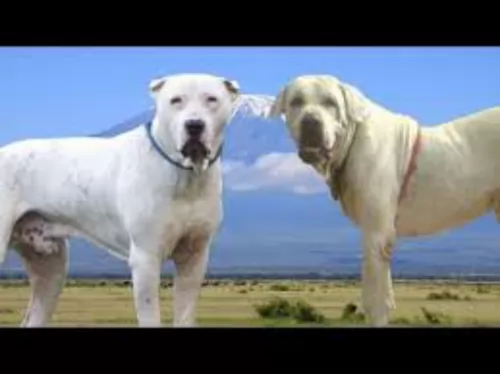 The short coat is low maintenance and as a moderate shedder too, all that is required really is to give your Bully Kutta a good brush twice a week to keep the coat in good condition.
The short coat is low maintenance and as a moderate shedder too, all that is required really is to give your Bully Kutta a good brush twice a week to keep the coat in good condition.
Brush his teeth 2 or 3 times a week with special canine-toothpaste and toothbrush to prevent plaque build-up. He’s a drooler too, so you will need to wipe his face and maybe your clothes of slobber from time to time.
This strong, muscular dog of yours will require an excellent diet. It’s always wonderful if you can give him home-made food such as vegetables, rice and meat. These days you get excellent commercially manufactured food for dogs, and your vet can advise you on the best food for a large, active dog such as the Buly Kutta.
Raw meat is absolutely essential for your dog from time to time and will ensure that his coat doesn’t become dull and with bald spots. Remember, that before dogs were domesticated they used to live on raw meat, so see that he gets some raw meat to prevent skin disorders. Make sure your large pet has a constant supply of fresh, cool water.
Bully Kuttas are going to need a walk every day in the form of exercise. If he is socialized you can take him into the park for ball games. He is a dog that will require plenty of space.
 As a medium- to large-sized dog breed, the Greenland Dog will require a high-quality commercial dog food if that is what you will be feeding him. The top quality brands have the right mix of vitamins and minerals in them for health.
As a medium- to large-sized dog breed, the Greenland Dog will require a high-quality commercial dog food if that is what you will be feeding him. The top quality brands have the right mix of vitamins and minerals in them for health.
However, it is wise to ensure that such an active dog breed gets his quota of raw meat in too. He has been used to eating fish and seal meat and will require this raw diet too. Sometimes if you cook rice, chicken and vegetables, you can add this into his kibble too.
Greenland Dogs need to be groomed at least twice a week to keep the thick coat in tip top condition. He sheds throughout the year.
He will also require you brushing his teeth to get rid of plaque which can cause a host of health issues. You get special toothpaste and toothbrush for dogs. His teeth should be brushed 2 or 3 times a week.
Make sure you give your high-energy Greenland Dog the right dose of exercise. He is intelligent too so he needs walks, games and other activities that contribute towards his physical and mental wellbeing.
He will do well on large properties or farms but won't do well where the space is tiny and where the owners are inactive couch potatoes.
Be careful too that the Greenland Dog isn't exercised immediately after eating as this puts him in danger of developing bloat.